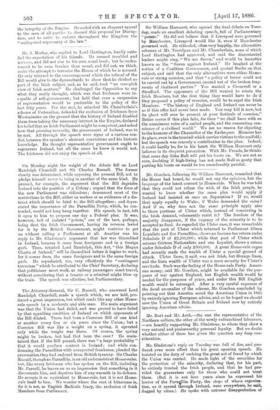Mr. Goschen, following Sir William Harcourt, remarked that the House
had heard, he would not say the opinions, but the language of the latest convert to Home-rule. When he was told that they could not refuse the wish of the Irish people, he wanted to know whether the same plea would apply if Ireland had insisted at once on Separation ? If so, would that apply equally to Wales, if Wales demanded the same ? And if so, why does not the same principle apply also to those portions of Ulster which, instead of concurring in the Irish demand, vehemently resist it ? The freedom of the majority disappears, if the urgency of the minority is to be accepted as final. As regarded the Ulster case, it was remarkable that the part of Ulster which returned to Parliament fifteen Loyalists and five Parnellites, shows an Income-tax return under Schedule D of 22,200,000 ; while that part of Ulster which returns thirteen Nationalists and one Loyalist, shows a return under Schedule D of only £300,000. A great Home-rule organ had recently made the wealth of Ulster a special ground of attack. Ulster linen, it said, was not Irish, but Orange linen, and the linen wealth of Ulster was a mere security for Ulster's servitude. Such was the feeling of the Home-rule Party. Ameri- can money, said Mr. Goachen, might be available for the pur- poses of war against England, but English wealth would be needed for the purposes of peace, and under this Bill English wealth would be estranged. After a very careful exposure of the fiscal anomalies of the scheme, Mr. Goschen concluded by pointing out that America saved the American Union in 1865 by entirely ignoring European advice, and so he hoped we should save the Union of Great Britain and Ireland now by entirely ignoring American advice.


































 Previous page
Previous page